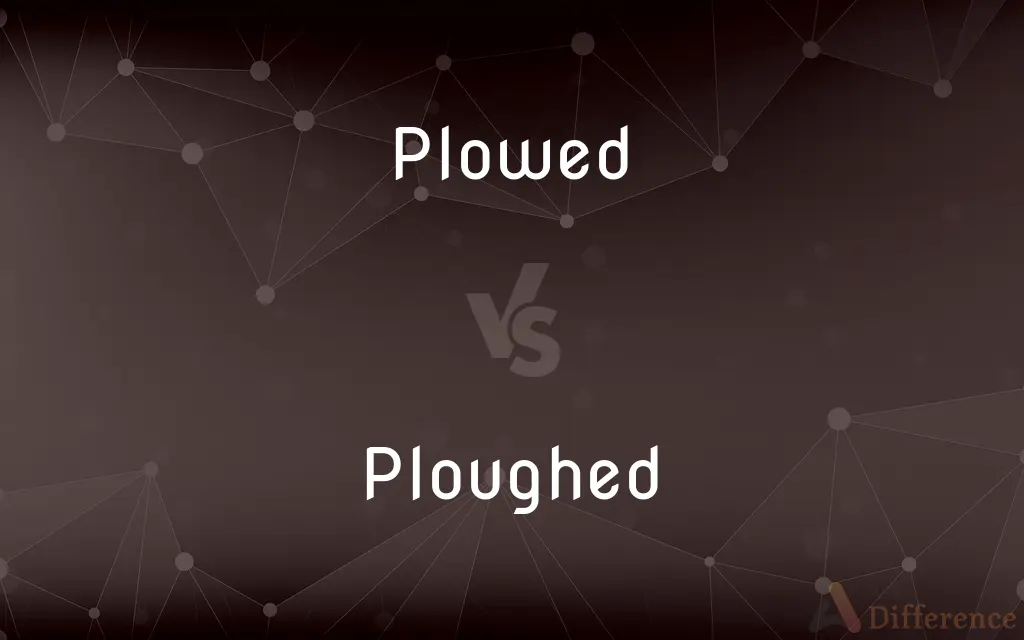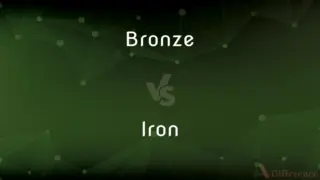Plowed vs. Ploughed — What's the Difference?
Edited by Tayyaba Rehman — By Maham Liaqat — Updated on May 2, 2024
Plowed is the preferred spelling in American English for describing soil that has been turned over, whereas ploughed is favored in British English.

Difference Between Plowed and Ploughed
Table of Contents
ADVERTISEMENT
Key Differences
In American English, "plowed" is the past tense of plow, referring to the act of turning over the soil in preparation for planting. This version is streamlined and fits the typical American preference for simpler spellings. On the other hand, "ploughed" is the British English version, reflecting the traditional spelling still used in the UK and other Commonwealth countries. It is often seen in texts that adhere to British norms and linguistic styles.
While "plowed" typically appears in American literature, manuals, and educational materials about farming and cultivation, "ploughed" finds its place in similar contexts within British, Australian, or Canadian English. This distinction is crucial for understanding regional usage and can affect the interpretation of texts depending on the reader's familiarity with either form of English.
"Plowed" is often associated with American agricultural terminology and is used in metaphoric expressions like "plowing through work." On the other hand, "ploughed" is similarly used in British English to denote hard, thorough work, whether in literal or figurative contexts.
When it comes to digital content and global communication, "plowed" might be more universally recognized due to the influence of American media and software which use American English as the default. In contrast, "ploughed" remains a hallmark of texts aiming to preserve the flavor of British English.
In terms of linguistic evolution, "plowed" reflects broader trends in American English towards phonetic spellings that simplify words. Conversely, "ploughed" preserves older forms and connects more directly to the term's origins in Old English, illustrating how language evolves differently in separate dialects.
ADVERTISEMENT
Comparison Chart
Preferred Spelling Region
American English
British English
Context of Use
American literature and manuals
British, Australian, Canadian texts
Metaphoric Usage
Common in phrases like "plowing through work"
Used similarly in British English
Influence of Media
Often seen in American media
Less common in global media outside Commonwealth
Linguistic Trends
Reflects phonetic simplification
Preserves traditional spelling
Compare with Definitions
Plowed
Turned over the upper layer of soil.
The farmer plowed the field in early spring.
Ploughed
Reinvested profits into a business.
The company ploughed its earnings back into research.
Plowed
Caused to move in a way that clears a path.
The truck plowed the snow from the driveway.
Ploughed
Turned over soil in preparation for sowing.
He ploughed the field under the warm April sun.
Plowed
Moved forcefully through something.
She plowed through the crowd to reach the stage.
Ploughed
Moved with great effort through something.
They ploughed through the accumulated reports.
Plowed
Invested heavily in an effort.
He plowed all his savings into the new business.
Ploughed
Made one's way with difficulty.
She ploughed through the novel despite finding it dull.
Plowed
Advanced with difficulty.
We plowed through the dense text of the legal document.
Ploughed
Cleared or made a way through.
The service vehicle ploughed the streets clear of debris.
Plowed
A farm implement consisting of a strong blade at the end of a beam, usually hitched to a draft team or motor vehicle and used for breaking up soil and cutting furrows in preparation for sowing.
Ploughed
A farm implement consisting of a strong blade at the end of a beam, usually hitched to a draft team or motor vehicle and used for breaking up soil and cutting furrows in preparation for sowing.
Plowed
An implement or machine designed to move earth, snow, or other material by means of a strong blade.
Ploughed
An implement or machine designed to move earth, snow, or other material by means of a strong blade.
Plowed
Plow See Big Dipper.
Ploughed
Plow See Big Dipper.
Plowed
To break and turn over (earth) with a plow.
Ploughed
To break and turn over (earth) with a plow.
Plowed
To form (a furrow, for example) with a plow.
Ploughed
To form (a furrow, for example) with a plow.
Plowed
To form furrows in with a plow
Plow a field.
Ploughed
To form furrows in with a plow
Plow a field.
Plowed
To form wrinkles or creases in
His forehead was plowed with lines of stress.
Ploughed
To form wrinkles or creases in
His forehead was plowed with lines of stress.
Plowed
To move or clear (snow, for example) by means of a plow.
Ploughed
To move or clear (snow, for example) by means of a plow.
Plowed
To clear (an area) of snow or other material by means of a plow.
Ploughed
To clear (an area) of snow or other material by means of a plow.
Plowed
To make or form with driving force
I plowed my way through the crowd.
Ploughed
To make or form with driving force
I plowed my way through the crowd.
Plowed
To progress through (water)
Plow the high seas.
Ploughed
To progress through (water)
Plow the high seas.
Plowed
Vulgar Slang To have intercourse with (another). Used of a man.
Ploughed
Vulgar Slang To have intercourse with (another). Used of a man.
Plowed
To break and turn up earth with a plow.
Ploughed
To break and turn up earth with a plow.
Plowed
To move or clear material such as snow with a plow.
Ploughed
To move or clear material such as snow with a plow.
Plowed
To admit of plowing
Rocky earth plows poorly.
Ploughed
To admit of plowing
Rocky earth plows poorly.
Plowed
To move or progress with driving force
The ball carrier plowed through the defensive line.
Ploughed
To move or progress with driving force
The ball carrier plowed through the defensive line.
Plowed
To proceed laboriously; plod
Plowed through the backlog of work.
Ploughed
To proceed laboriously; plod
Plowed through the backlog of work.
Plowed
Simple past tense and past participle of plow
Ploughed
Simple past tense and past participle of plough
Plowed
Turned over with the blade of a plow to create furrows (usually for planting crops).
Ploughed
Turned over with the blade of a plough to create furrows (usually for planting crops).
Plowed
Well-trodden or well-researched, previously explored.
Ploughed
Well-trodden or well-researched, previously explored.
Plowed
Drunk.
Ploughed
(of farmland) broken and turned over with a plow;
Plowed fields
Plowed
Page 72]:
Plowed
(of farmland) broken and turned over with a plow;
Plowed fields
Common Curiosities
Where might one see "ploughed" used more frequently?
In British and Commonwealth countries' publications and writings.
What is the main difference between "plowed" and "ploughed"?
"Plowed" is American English, while "ploughed" is British English.
Is there a difference in pronunciation between "plowed" and "ploughed"?
No, both words are pronounced the same way.
Why does American English prefer "plowed"?
American English favors simpler, more phonetic spellings.
Are there any metaphoric uses of "plowed" or "ploughed"?
Yes, both can describe working through something with effort.
How do digital platforms typically handle these variations?
Many use American English as the default setting, favoring "plowed."
Does the spelling variation affect the meaning of the words?
No, the meaning remains the same across both spellings.
How do style guides handle "plowed" vs. "ploughed"?
Style guides recommend using the spelling consistent with the document's version of English.
Can "plowed" and "ploughed" be used interchangeably?
Yes, but usage typically depends on the regional audience.
Can using "ploughed" in an American context confuse readers?
It might, especially if the reader is unfamiliar with British English.
Which spelling is more commonly seen in global English language teaching?
"Plowed" might be more commonly taught due to the global influence of American English.
What historical reasons explain the different spellings?
Spelling variations evolved with separate publishing standards and dictionaries in the UK and US.
Do education systems in the UK and US teach both spellings?
Typically, each system teaches its regional spelling but may expose students to the alternative as part of English literature studies.
Are there any legal implications in using one spelling over the other in official documents?
No legal implications, but consistency with regional language standards is generally advised.
How should writers choose between "plowed" and "ploughed"?
Writers should consider their audience and the version of English expected by their readers.
Share Your Discovery

Previous Comparison
Our vs. Ours
Next Comparison
Bronze vs. IronAuthor Spotlight
Written by
Maham LiaqatEdited by
Tayyaba RehmanTayyaba Rehman is a distinguished writer, currently serving as a primary contributor to askdifference.com. As a researcher in semantics and etymology, Tayyaba's passion for the complexity of languages and their distinctions has found a perfect home on the platform. Tayyaba delves into the intricacies of language, distinguishing between commonly confused words and phrases, thereby providing clarity for readers worldwide.
















































